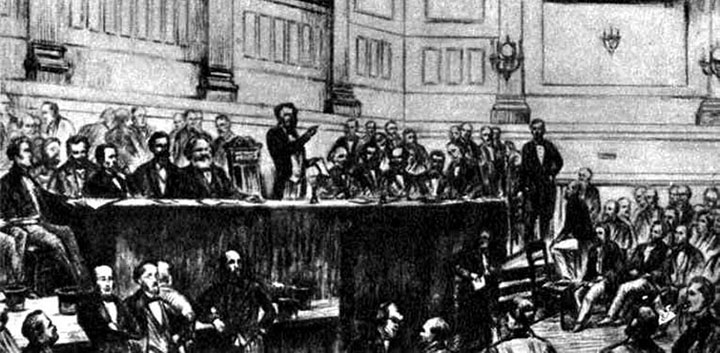On September 28th 1864, a public meeting was summoned by George Odger, president of the London Council of Trade Unions, and Randal Cremer, secretary of the Mason’s Union. The meeting took place at St. Martin’s Hall, now Queen’s Theatre, which had a capacity for 4,000 people. In a letter to Engels dated November 4 1864, Marx describes the meeting:
“At the meeting, which was packed to suffocation, Major Wolff represented the London Italian Working Men’s Society. It was decided to found a ‘Working Men’s International Association’, the General Council of which should be in London and should act as an ‘intermediary’ between the workers’ societies in Germany, Italy, France, and England. Ditto that a General Working Men’s Congress should be summoned in Belgium in 1865. A provisional committee was appointed at the meeting: Odger, Cremer, and many others, some of them old Chartists, old Owenits, etc., for England; major Wolff, Fontana, and other Italians for Italy; [Victor] Le Lubez, etc., for France; [Johann] Eaccrius and I for Germany.”
Marx then says that a subcommittee was formed at the following meeting of the provisional committee to outline a declaration of principles and provisional statutes. The following subcommittee meeting and provisional committee weren’t attended by Marx. What is said about them is of interest. At the first meeting of the subcommittee the declaration of principles and provisional statutes were outlined. The declaration of principles were described as being “a program of indescribable breadth and full of the most extreme confusion,” and the statutes were described as “a compilation of [Giuseppe] Mazzini’s, so you already know the spirit and phraseology in which the real question, the workers’ question, was dealt with.” Mazzini’s ideas included Italian nationalism and collaboration between the workers and capitalists. Unsurprisingly the subsequent provisional committee meeting didn’t accept either the principles or the statutes and sent them to be redrafted.
After much back and forth discussion over the papers that the subcommittee produced, they were finally left with Marx for his opinion. Marx, in his letter to Engels, describes what he decided to do with the papers:
“I saw that it was impossible to make anything out of the stuff. In order to justify the extremely strange way in which I intended to present the ‘sentiment’ already ‘voted for’, I wrote an Address to the Working Classes (which was not in the original plan: a sort of review of the adventures of the working classes since 1845); on the pretext that everything material was included in the address and that we ought not to repeat the same things three times over, I altered the whole preamble, threw out the declaration of principles, and finally replaced the 40 rules with 10. Insofar as international politics come into the address, I speak of countries, not of nationalities.”
In his address to the workers Marx spoke of the workers responsibility to fight for their own interests and emancipation:
“If the emancipation of the working classes requires their fraternal concurrence, how are they to fulfil that great mission with a foreign policy in pursuit of criminal designs, playing upon national prejudices, and squandering in piratical wars the people’s blood and treasure? It was not the wisdom of the ruling classes, but the heroic resistance to their criminal folly by the working classes of England, that saved the west of Europe from plunging headlong into an infamous crusade for the perpetuation and propagation of slavery on the other side of the Atlantic. The shameless approval, mock sympathy, or idiotic indifference with which the upper classes of Europe have witnessed the mountain fortress of the Caucasus falling a prey to, and heroic Poland being assassinated by, Russia: the immense and unresisted encroachments of that barbarous power, whose head is in St. Petersburg, and whose hands are in every cabinet of Europe, have taught the working classes the duty to master themselves the mysteries of international politics; to watch the diplomatic acts of their respective governments; to counteract them, if necessary, by all means in their power; when unable to prevent, to combine in simultaneous denunciations, and to vindicate the simple laws or morals and justice, which ought to govern the relations of private individuals, as the rules paramount of the intercourse of nations. The fight for such a foreign policy forms part of the general struggle for the emancipation of the working classes.”
Marx brought the workers struggle into the international stage and spoke of workers as an international class rather than separate nationalities, highlighting the importance of an international workers organisation. When writing of The First International, historian G. M. Stekloff called Marx “the soul of the international.” Marx’s devotion to the workers proves Stekloff’s words.






